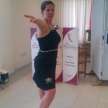Listening Fatigue
Understanding and Overcoming It

I am sitting in a lecture hall, trying desperately to concentrate. Seemingly outside of my control, my mind wanders. I pull my focus back on my professor, only for my mind to start wandering again mere minutes or seconds later. Taking notes only makes my lack of concentration worse. With my head down, I cannot rely on lipreading to understand what the professor is saying. I miss a few words. Then a few more. Soon, I am several sentences behind what the professor is saying, desperately trying to catch up. The constant push and pull with my waning attention span and the struggle to understand what the professor is saying while attempting to fill in the blanks of half heard sentences leaves me exhausted. At the end of the two hour class period, I feel reprieved but it doesn't last long. Too reserved to draw attention to my hearing loss by asking the professor to repeat themselves, I muddle through the rest of the day. Labs are the best part since they involve hands on learning and not as much listening. I go home feeling exhausted, too tired to study until many hours later. The administration is of little help since their suggestion at an academic review is for me to tape record the class, not an ideal solution for someone who depends on lip reading for comprehension. A few attempts at using a tape recorder leave me frustrated since I can't understand what is being said when I playback the tape. I soon give up and continue to muddle through my classes. I blame myself for my short attention span, believing that if I concentrated harder, I would do better in school.
Fast forward ten years later. I am now a chiropractor, working on creating a video about chiropractic in ASL (American Sign Language) with two sign language interpreters. The interpreter doing the signing for the video is a CDI (Certified Deaf Interpreter) and exclusively uses ASL. She communicates through the hearing interpreter. As my natural tendency is to look at her when she is signing, I repeatedly forget to look at the other interpreter who is translating for her. Since I am not lipreading, I again miss much of what is being said. At the end of the day, I am exhausted and completely drained, which is surprising to me as my part in the video creation process is not taxing, either mentally or physically. In a Facebook group for those in the Deaf and Hard of Hearing community, I learn the name for my mental confusion. I have listening fatigue.
Listening fatigue occurs with those who have hearing loss because the brain has to expend a great deal of energy interpreting what others are saying. Placed in a noisy environment or a situation where a lot of listening is required, the brain tires out faster and we begin to miss more and more of what is being said and what is going on. This then leads to confusion and a sense of mental exhaustion.
So, why have I spent the past couple of paragraphs detailing my experiences? First, to let people who experience listening fatigue know that this is not their fault and they shouldn't blame themselves for their lack of focus, like I did many years ago in school. Secondly, to let those who are hearing and don't struggle with listening fatigue understand what those with hearing loss go through.
If you are a teacher or someone who lectures for a living, whether that be in a classroom or through seminars and workshops, know that there may be people in the audience with hearing loss who may be struggling to understand what you are saying and may not be comfortable telling you. Also, realize that the brain can only fully concentrate on a task for 20 minutes so if you keep talking without giving breaks, most of your audience will be zoning out anyway. If you see people zoning out, understand that they may be trying to concentrate but are having a hard time focusing because of mental tiredness. Schedule breaks and hands on activities into your lectures to keep people engaged. And make it easy for others to come to you with their struggles.
If you are struggling with listening fatigue, know that you are not alone. There are many others who struggle with listening fatigue or just a general lack of concentration due to ADD or another cause. While you may not be able to fully overcome listening fatigue, these tips may help. First, make sure you are well hydrated. Studies show that even a 10 percent drop in hydration can cause a decrease in concentration and the ability to retain the material you are listening to. Also, eat a meal or snack beforehand that includes protein and fiber so that you won't be hungry. Avoid sugary foods as they cause your blood sugar to spike and crash, which will make you feel tired. Also, avoid a heavy meal because the energy that your stomach needs to digest the food will take away from the energy going to your brain. Anxiety over the information you are missing will also decrease your ability to focus so try doing some breathing exercises to calm down. Taking deep breaths and breathing into your belly (letting your abdomen rise and fall) will activate the parasympathetic system in your nervous system which is responsible for rest and relaxation. Conversely, shallow breathing or chest breathing makes you feel like you are hyperventilating and will increase your anxiety. Repeating a few phrases designed to boost your confidence or sense of calm may also help. Take breaks when given the opportunity and get away from the noise and chaos. Move when possible since that will increase blood flow to the brain and help you feel more awake and alert. And lastly, if you are comfortable, make the person giving the lecture aware of your hearing loss and that you may struggle to understand them and may need more breaks than the average person. These tips will help set you up for success as much as possible so you can look forward to your next lecture or workshop with confidence.

Photo by Nicholas Green on Unsplash
About the Creator
Jenny Beck
I am a chiropractor, health advocate and advocate for the Deaf and Hard of Hearing community. I love to travel and spent several years working overseas in Indonesia and Ghana. @aslchiro- Instagram






Comments
There are no comments for this story
Be the first to respond and start the conversation.